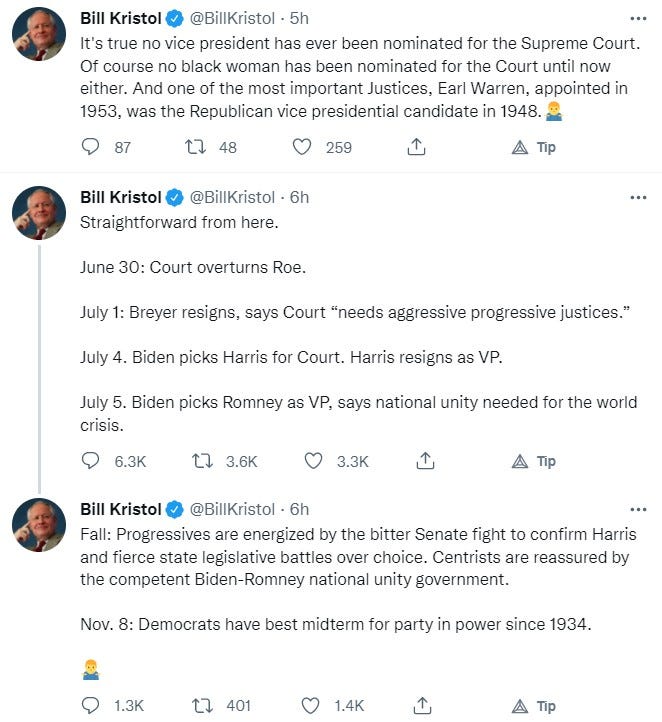Could VP Harris Cast the Tie-Breaking Vote to Confirm Herself to the Supreme Court?
Short answer: Yes. It may look unseemly, an obvious conflict of interest, and political suicide by Joe Biden and Democratic Senators, but Senate rules do not prohibit it.
(Updated: See below)
As political prognosticators engage in their usual bourbon-inspired scenarios for filling a vacancy on the Supreme Court, an interesting question comes to mind.
It has already been speculated that highly-unpopular Vice President Kamala Harris, a former California Attorney General, and US Senator, could be a convenient nominee. People imagine that given how badly she has performed as Vice President, a lifetime appointment to the Supreme Court might be the ticket. Bring in a new Vice President who can save Democrats from themselves (who, exactly?). That new VP would help resurrect a failing presidency and provide a pathway to success in 2024.
First, that’s not going to happen. Harris would rather be President than a Supreme Court Justice, a job she is also essentially not fit for and would likely find boring, other than being Chief Justice. That job is taken. Thank God.
Second, let’s say Biden nominates her, and she agrees. Her confirmation would be political catnip for Republicans and conservative activists who would resurrect her rise to power courtesy of former California Assembly Speaker and San Francisco Mayor Willie Brown. Her record as Attorney General helped lead to her downfall during the 2020 Democratic presidential primary, courtesy of former Democratic US Rep. and fellow presidential candidate Tulsi Gabbard (HI). CNN’s delusional Chris Cizzilla quotes Gabbard’s takedown of Harris that catapulted her from the race even before the Iowa caucus. This will be fine fodder for a future Kamala Harris confirmation hearing:
“Senator Harris says she’s proud of her record as a prosecutor and that she’ll be a prosecutor president.
“But I’m deeply concerned about this record. There are too many examples to cite but she put over 1,500 people in jail for marijuana violations and then laughed about it when she was asked if she ever smoked marijuana.
“She blocked evidence – she blocked evidence that would have freed an innocent man from death row until the courts forced her to do so. She kept people in prison beyond their sentences to use them as cheap labor for the state of California.”
And never mind what then-candidate Joe Biden had to say about Kamala Harris’ record.
As we saw with the nominations by President Trump of Brett Kavanaugh and Neil Gorsuch, let's say that we have deeply partisan deliberations - Republicans universally oppose the nomination. At the same time, loyal Democrats stick with the nominee, no matter the political costs.
So the Senate Judiciary Committee reports the vote on a tie vote, 11-11. It comes to the floor. All 50 GOP Senators (I know, unlikely) announce they’ll vote against Harris for the Supreme Court. All 50 Democratic Senators announce their support.
Who is the tie-breaking vote? The Vice President, Kamala Harris.
Do Senate rules permit a senator to cast a vote in support of their nomination? Do the rules, or the Constitution, enable a Vice President to cast a tie-breaking vote on their nomination? Is there any conflict of interest rules that require them to recuse themselves from such a vote?
The answer is no. In this instance, Harris can cast the tie-breaking vote to confirm her nomination for the Supreme Court.
From WUSA channel 9 in Washington, DC, citing former US Senate historian (and friend) Don Ritchie:
“There's no prohibition against voting for oneself in either the Senate rules or the constitution, except for good taste, discretion, and an odor that would inevitably taint the rest of their career,” Ritchie said.
As far as any historical precedent, Ritchie was not sure.
“I don't know of any judicial examples, but during the Andrew Johnson impeachment trial, the Senate's president pro tempore Ben Wade voted to remove Johnson from office, even though that would have made him president,” he said.
All of our experts came to the same conclusion, if a senator is nominated for the Supreme Court vacancy, they can vote for themselves.
Don, now historian emeritus, is correct. Harris could be the deciding vote to put herself on the Supreme Court.
How Washington is that? As for the political consequence, I’ll let you decide. But no intelligent person thinks this scenario is likely except for the profoundly delusional former conservative Bill Kristol.
Would someone please check on Kristol? He needs an intervention. I’m not sure there’s a rehabilitation facility big enough for his ego or equipped to handle this level of lunacy. Even Senator Mitt Romney must be laughing, even though he could vote for himself to become the next Vice President.
Pardon me while I refill my glass with a bit more Maker’s Mark.
ADDENDUM: An important technical Senate-related correction to this post. I mentioned that the Senate Judiciary Committee could report a Harris (or, any) SCOTUS nomination to the floor on a tie vote.
Not true.
With a 50-50 Senate, the committee ratios are mostly tied. If there is a tie vote on reporting the nomination to the floor, the nomination literally sits there and would require a new set of parliamentary machinations to bring it to the floor for an up or down vote. As a reminder, in 2013, the Senate changed the rules to require only a simple majority - 51 votes - to confirm a new Justice.
Here’s what would have to happen. Geek out with me here.
Any Senator could move (motion) to go into “executive session” to consider a petition to discharge the nomination from the Judiciary Committee. While the motion to go into executive session (versus legislative session) is undebatable and subject to a simple majority, a discharge petition would be debatable and could be subject to the filibuster to pass. Oops.
But don’t count on that. Lindsey Graham or perhaps another Republican on the Judiciary Committee is likely to vote to report the nomination to the floor. But if the GOP wanted to play hardball . . . . stay tuned.






